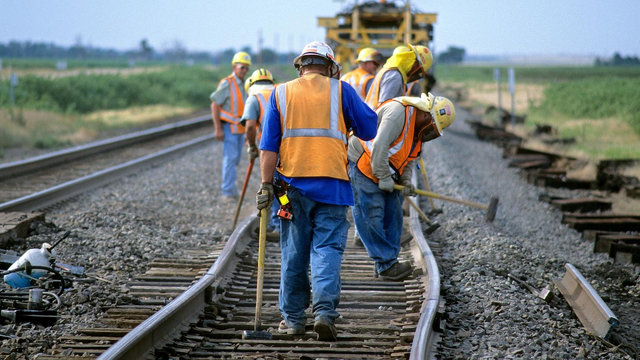
November 1, 2022
Railroads Are in the Spotlight of Economic Growth

Investing in Quality of Life for Our Employees
Freight railroads connect communities to each other and the world and, in the process, provide great jobs. The work is hard – often outdoors, in all kinds of weather, under strict deadlines and at all hours of the day. Continuing to respect and acknowledge these efforts is at the heart of labor negotiations with railroad unions. The end game is to provide jobs that attract the best talent in industrial America – which these agreements will help us achieve.
Railroaders deserve improved quality of life, and I'm working with Union Pacific leaders and peers across the industry to respond. Our focus is on safety, compensation, recruitment, retention and robust benefits. Safety always tops the list. From a compensation standpoint, current labor contracts being negotiated or ratified include historic raises – a 24% pay boost that will push average railroad salaries to $110,000 a year by 2025. I’m excited that Union Pacific exceeded our 2022 hiring goal, with 1,408 hired so far this year – and we are retaining that workforce. Our average employee retention rate has remained steady at nearly 90% for the past four years.
While we have significant momentum, we still need to clarify some misconceptions and provide solutions for employee concerns. Anecdotes during the current bargaining round that rail employees do not get time off work are untrue. Union Pacific employees receive several paid days off to use as personal days, holidays and sick days. No Union Pacific employee has been fired because of missing a single day of work, and we actively assist employees who encounter hardships that require time off.
We also need to support employees in several additional areas. Through the collective bargaining process, employees have said they’re concerned about work predictability, specifically those in unscheduled jobs. The PEB recommended dealing with that issue locally, at each railroad, and those discussions are underway. Employee feedback has driven recent strides such as updating our attendance policy to enable employees to earn and activate credits that allow them to take time off sooner. We are also learning from a pilot work/rest program that we hope to implement more broadly.
Achieving the Benefits of Precision Scheduled Railroading
For our customers, reliable, dependable service is paramount. That’s what has driven our use of Precision Scheduled Railroading (PSR) – a thoughtful operating strategy that has been implemented at many railroads. Through PSR, Union Pacific provides more consistent, reliable and predictable service that makes us more agile and responsive to our customers’ needs.
At its core, PSR consolidates networks, eliminates less efficient moves and increases train size. Fewer trains now move across our system, and at a faster pace. Longer trains deliver significant benefits to customers and remove big trucks from highways. That, in turn, cuts harmful emissions, eases traffic and helps prevent wear and tear on taxpayer-funded roads. Reducing train size, and therefore increasing the number of trains operating would only exacerbate network congestion and labor challenges.
In addition to reliable service, our customers expect competitive pricing. In these times when costs are rising, rail rates have increased much less than other modes of transportation or other parts of the economy. When adjusted for inflation, prices for rail transport are lower today than they were in 1980.
In addition to investing in our employees, Union Pacific also invests in infrastructure and technology. Overall, freight railroads invest six times more on capital expenditures as a percentage of revenue than the average U.S. manufacturer. Union Pacific invested nearly $12.3 billion in capital between 2018 and 2021. These investments keep the rail infrastructure strong, support growth in carload and intermodal business, allow us to reach new markets and provide more options for customers.
These are challenging times. Thankfully, we have the best employees in the industry doing the work, day in and day out. We’re serving our customers, investing in our communities, providing promising careers and enhancing shareholder value while operating in an ethical manner true to our values. This is both our history and our future, which has never been brighter.